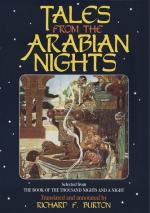History of Mohammed, Sultan of Cairo (pp. 25-35).
P. 25.—A few years ago, a travelling menagerie exhibited a pair of dog-faced baboons in Dublin as “two monstrous gorillas!”
P. 28.—Ma’aruf’s jewel has been already referred to. The present incident more resembles the demand made by the king and the wazir from Aladdin and his mother, though that was far more extravagant.
P. 29.—A more terrible form of these wedding disillusions, is when the bridegroom is entrapped into marriage by an evil magician, and wakes in the morning to find the phantom of a murdered body in the place of his phantom bride, and to be immediately charged with the crime. Compare the story of Naerdan and Guzulbec (Caylus’ Oriental Tales; Weber, ii. pp. 632-637) and that of Monia Emin (Gibb’s Story of Jewad, pp. 36, 75). Compare my Appendix, Nights, x. pp. 443, 449, 450.
P. 31.—There is a Western story (one of the latest versions of which may be found in Moore’s Juvenile Poems under the title of “The Ring”) in which a bridegroom on his wedding-day places the ring by accident on the finger of a statue of Venus; the finger closes on it, and Venus afterwards interposes continually between him and his bride, claiming him as her husband on the strength of the ring. The unfortunate husband applies to a magician, who sends him by night to a meeting of cross-roads, where a procession similar to that described in the text passes by. He presents the magician’s letters to the King (the devil in the mediaeval versions of the story) who requires Venus to surrender the ring, and with it her claim to the husband.
One of the most curious stories of these royal processions is perhaps the Lithuanian (or rather Samoghitian) story of
The King of the Rats.[FN#641]
Once upon a time a rich farmer lived in a village near Korzian, who was in the habit of going into the wood late in the evening. One evening he went back again into the wood very late, when he distinctly heard the name Zurkielis shouted. He followed the voice, but could not discover from whence the sound proceeded.
On the next evening the farmer went into the wood, and did not wait long before he heard the cry repeated, but this time much louder and more distinctly. On the third evening the farmer went again to the wood; but this time on Valpurgis-night—the Witch’s Sabbath. Suddenly he saw a light appear in the distance; then more lights shone out, and the light grew stronger and stronger; and presently the farmer saw a strange procession advancing, and passing by him. In front of the procession ran a great number of mice of all sorts, each of whom carried a jewel in his mouth which shone brighter than the sun. After these came a golden chariot, drawn by a lion, a bear, and two wolves. The chariot shone like fire, and, instead of nails, it was studded with dazzling jewels. In the chariot sat the King of the Rats and his consort, both clad in golden raiment.




